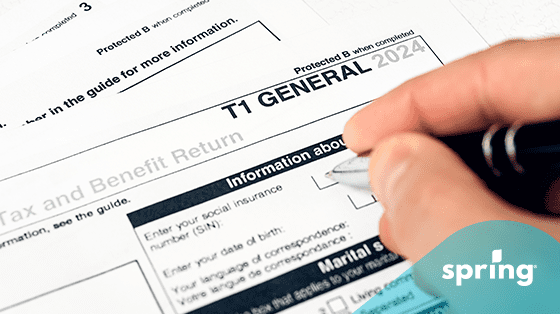All banks offer different rates when it comes to mortgages depending on your credit score as well as your financial situation. Already having an account with a certain financial institution or moving your accounts over can also affect the rate you get approved for. No matter who you choose, though, you want to ensure you get the best rate possible.
Bank of Canada Mortgage Rates
While the Bank of Canada doesn’t have their own mortgage rates, they do have a large influence on them. When mortgage rates are given in Canada by banks, these rates are based on the Bank of Canada’s prime rate. Currently, the prime rate in Canada is 6.7%. Lenders then use this number to get you the best mortgage rates possible.
The Bank of Canada decides on the prime rate in Canada by using Canada’s inflation rate. This prime rate is used to influence the rate of inflation and make sure it’s within it’s target threshold. Since the rate of inflation has been stabilizing lately, the prime interest rate is either staying the same or decreasing.
Another factor to consider that affects mortgage rates is the bond market, specifically bond yields. Banks use this as well as the prime rate in order to set their mortgage rates.
The Easiest Bank to get a Mortgage
There is a common misconception that mortgages can be one of the most difficult types of loans to get. In actuality, it is easier to get a mortgage than you may think. This is mostly because a mortgage is a secured loan. The lender can use the home as collateral making their risk much less than that of a large unsecured loan.
That being said, usually, the easiest bank to get a mortgage with is the financial institution you already bank with. This is because they already have a lot of your accounts with them and want to do whatever is possible to keep your business with them. That being said, it doesn’t guarantee that you will get approved. You still have to meet the requirements to get a mortgage and fall within the proper debt-to-income ratio. This is usually 40% or under but can be up to 50%, depending on the lender. Even if you are approved by your current financial institution, that does not guarantee that you will get the best mortgage rate.
Otherwise, another option is to go with a smaller or alternative lender. Sometimes the big banks can be stricter when it comes to mortgage approvals. Smaller institutions like credit unions and online lenders can be easier to get mortgage approvals from, even if the interest rate is slightly higher.
Best Bank for a Home Mortgage
Picking who the best mortgage lenders are is going to be different for everyone. That said, a really popular bank for mortgages that always has great rates is Tangerine. You can apply online or over the phone, but their rates start as low as 4.49%.
Big 5 Banks for Mortgages
When it comes to getting a mortgage, there are a few reasons why the top 5 banks are the first that a buyer will check with. This is because they can provide more competitive loan terms and significant discounts. Depending on the type of mortgage you are looking for, it will also make a difference in the bank that you choose.
RBC Royal Bank
In terms of fixed mortgages rates, RBC’s rates are quite competetive. They are one of the world’s largest banks and serve over $16 million customers. Offering some of the best fixed-rate mortgage rates helps keep them there. Fixed-rate mortgages are one of the most popular types of mortgages, especially in a higher-inflation economy.
With a fixed-rate mortgage with RBC, your rate can be guaranteed up to 120 days before the closing of a sale or 30 days before your renewal date. This guarantees your payments are locked in for the duration of the agreement, even before you finalize your mortgage.
The main reason buyers tend to prefer a fixed-rate mortgage is because nothing changes. Unlike a variable rate mortgage, a fixed rate mortgage keeps everything locked in for the duration of the term. There are no changes to your:
- Interest rate
- Amortization
- Principle amount
- Monthly payments
CIBC
While CIBC is also competitive when it comes to getting a mortgage, they are the recommended bank to contact if you need to refinance your mortgage. There are many reasons that you may choose to refinance, but the most common reason is to renew when your term ends. This is normally every 5 years, but it can be sooner depending on the term you signed for.
Refinancing can be confusing but when you first get a mortgage, you are amortized for a certain amount of time. This is usually 25 years but the length can be different depending on your individual situation. With that amortization rate, you sign for a term at a certain interest rate. Once that rate ends then you have to renew for a new term based on the remaining amortization.
BMO
The Bank of Montreal (BMO) is considered to be the fourth largest bank in Canada, with over 8 million customers. While RBC is known for its fixed-rate mortgages, BMO is recommended for Variable-rate mortgages. This is because BMO variable mortgage payments don’t change. You still make the same monthly mortgage payments even if the interest rates rise; your principal-to-interest rate ratio just changes. The only time your monthly payment changes is if the interest payment exceeds that locked-in monthly payment.
TD Bank
TD’s mortgage specialty is collateral mortgages. These are sort of like readvanceable mortgages. This entitles you to take out the value or a portion of the value of your home if it is paid off or if a portion of it is. This is based on approval, of course. They use the equity in your homes as collateral against your line of credit.
Some perks to a normal mortgage from TD are that you can pick your payments as well as the length of the mortgage. This gives you a little more freedom and flexibility when it comes to your mortgage payments.
Scotia Bank
The Bank of Nova Scotia, also known as Scotiabank, is the second largest bank and has over 11 million Canadian customers. Being such a large bank, this allows them to offer something called STEP (Scotia Total Equity Plan).
STEP allows you to use your home’s equity as a way to borrow money. You can use a variety of lending options, such as:
- Mortgages
- Lines of credit
- Credit cards
- Personal loans
There are also a variety of other lending options available as well. The lending option chosen is based on your specific needs and it’s just one application.

How Mortgages Work
Even though there are posted mortgage rates, they really just depend on your individual factors. While the rates may seem low, even percentage points make a difference since they’re compounded semiannually. The financing rate will also change whether you’re financing rental properties or your primary residence. Other things that make a difference are whether or not you get a conventional mortgages, or insured or uninsured mortgages. Your credit report, debt ratios, any existing mortgages, and home equity lines will make a difference.
When it comes to your monthly mortgage payment, it’s important to remember that this is only part of your monthly housing costs. You also have to think about property taxes and condo fees.
Differences Between Mortgages on New Purchases and Renewals
If you’re just purchasing a home and getting a new mortgage, you can use a mortgage expert to help you get the lowest mortgage rates. Mortgage brokers will compare rates for the big banks as well as other lenders to help you get the most affordable home financing. Most lenders will also try to get competitive rates for you themselves.
With Canada’s cut rates, it’s becoming simpler to find an affordable mortgage before your closing date. That said, your mortgage amount isn’t the only cost to consider. There are also closing costs and real estate lawyer fees to consider.
When you’re in the market for a mortgage renewal, the mortgage cost is all you have to consider. No matter what your mortgage amount is, looking at different mortgage options through different lenders can help you save money. Your current lender might not have the best rate to offer you. It won’t cost you to switch lenders if you’re up for a renewal. If you’re not up for renewal, the bonne fide sales clause in a closed mortgage will require you to pay a fee. However, a few lenders won’t require this clause.
Closed and Open Mortgages
We know there are different types of mortgages available based on the interest rates that you choose, but did you know that there are also open and closed mortgages. This affects how much money you are able to put on the principle.
Open mortgages allow you to put money down on the principal whenever you choose, on tope of the down payment, without a penalty. Using this feature allows you to reduce the amount of money you put towards your overall interest as well as pay your mortgage early in installments or a lump sum payment.
Closed mortgages are different. With a closed mortgage, you are limited to when you can put extra money down on the principal. There is usually a certain amount allowed per year, and anything over that is subject to a penalty. That being said, a closed mortgage often has a lower interest rate than an open mortgage. Keep in mind that this type of mortgage is based on the finance term and not the amortization period. This means if you get a closed mortgage, but you don’t like it, when you refinance, you can try for an open mortgage.
Rates of the Top 5 Banks
With high inflation rates right now and the Bank of Canada currently increasing the Prime Rate in order to cool off the housing market, current Canadian mortgage rates are high. This makes it more crucial than ever to make an informed decision on the rates you choose for your mortgage. Here are the current mortgage rates in Canada at the top 5 banks.
| Bank | 5 Year Variable | 5 Year Fixed | 3 Year Fixed |
| RBC | 4.580% (prime-0.40%) | 4.490% | 4.440% |
| TD | 4.79% (prime-0.31%) | 4.54% | 4.49% |
| CIBC | 4.95% | 6.49% | 6.64% |
| BMO | 4.65% (prime -0.3%) | 4.64% | 4.44% |
| Scotiabank | 5.400% | 6.09% | 6.050% |
No matter where you live in Canada, these mortgage rates stay the same. When you compare mortgage rates for these banks, currently, RBC has the best rates for a 5-year fixed mortgage, TD for a 3-year fixed, and RBC for a 5-year variable. That being said, these rates are based on approval. It depends on the type of mortgage you need, your overall debt service ratios, your credit score as well as your financial history with the bank.
Before you make any decisions regarding your mortgage, whether it be for rental and investment properties or residential mortgages, you should see which bank suits your needs along with the rates. A good way to do this without having to go to multiple lenders is to get a mortgage broker. Mortgage brokers can find a mortgage that suits your needs, while finding you the best rate, whether it is with a top 5 bank, regular bank or a non bank lender.
Mortgage Rates Based on Province
While mortgage rates in Canada are generally similar, the rate per province does depend on the competition in that province. That said, prime is the same throughout the country due to the national average, so the rates won’t vary too much.
- British Columbia – 4.49% for a 5-year fixed mortgage
- Alberta – 4.24% for a 5-year fixed mortgage
- Saskatchewan – 4.09% for a 5-year fixed mortgage
- Manitoba – 4.59% for a 5-year fixed mortgage
- Quebec – 4.36% for a 5-year fixed mortgage
- Ontario – 4.59% for a 5-year fixed mortgage
- Newfoundland and Labrador – 4.49% for a 5-year fixed mortgage
- Nova Scotia – 4.49% for a 5-year fixed mortgage
- PEI – 3.91% for a 5-year fixed mortgage
2 Year Variable Mortgage Rates
As you may have noticed, the shorter period of time the mortgage term is, the higher the interest rate. That said, variable rate mortgages tend to have lower interest rates than fixed rate mortgages. While all banks vary in what mortgage rates they offer, right now the rate for 2 year variable mortgages is sitting around 7.34%, However, as the prime rate in Canada changes, so will these rates.
Non-Bank Mortgage Lenders
If, for some reason, the banks aren’t approving you for a mortgage or you are looking for a non-bank alternative, don’t worry, you actually have a lot of options. There are plenty of non-bank lenders that give mortgages. Many of these non bank mortgages are also online Canadian mortgage lenders.
- First National
- Home Trust
- MCAP
- Street Capital
- Credit Unions
- Merix Financial
- Spring Financial
- Equity Financial Trust Company
These are just to name a few. There are actually so many more. No matter what kind of mortgage you are looking for, just because the large banks didn’t work out, don’t forget there are plenty of other financial institutions that might be willing to lend you what you need.
A and B Lenders in Canada
There are a few differences between A and B mortgage lenders. For starters, A lenders tend to fund those with higher credit scores and stable incomes. These lenders are federally regulated banks or provincially regulated credit unions. B Lenders, on the other hand, are quasi-regulated. Meaning they aren’t directly federally regulated, but they do have to follow regulations because of the business they are involved in.
Most mortgages are funded by A lenders in Canada, such as the top 5 banks as well as the National Bank. Over 27% of bank mortgages are funded by RBC alone. That being said, many home buyers are choosing to turn to B Lenders. There are a few reasons for this, such as having lower credit scores, getting denied by larger banks, or just choosing to use an alternative lender.
In some cases, using a B lender can actually save you some money. It all really depends on your individual circumstances and what the lender is willing to lend you. It also makes a difference on whether the B lender gives you an open or a closed mortgage.
Mortgage Insurance
When you’re looking into different mortgage products, an important thing to consider is if you qualify for the Canada Mortgage and Housing Corportations mortgage default insurance. If you’re a first time home owner, and purchasing a home uner $1,000,000 you can qualify for this insurance which allows you to put a minimum down payment of less than 20%. However, having this insurance may affect the interest rate the bank chooses to give you.
If you do use mortgage default insurance, you will need to have high credit scores in order to get approved. According to CMHC regulations, in order to pass the mortgage stress test, you need a minimum credit score of 600 in order to qualify and get a mortgage approval, along with other factors. However, if you go with an insured mortgage, some lenders may choose to approve you with bad credit; you just won’t get the most competitive interest rates.
Mortgage Lenders or Mortgage Brokerages
When you’re in the market for a mortgage there are plenty of lenders to choose from. You can choose to go with a certain lender and see what their rates are, or you can choose to go with a mortgage broker. The great thing about mortgage brokers is they can take over the job of comparing mortgage rates and help you get set up with the right mortgage lender.
Because the Canadian housing market is so expensive right now, you may also not be looking for convential mortgage rates. You may need to find specific lenders which is where a mobile mortgage specialist can help. They have access to other mortgage lenders and credit unions, such as Meridian Credit Union, to help you get the best mortgage pre approval faster, which will lead to a mortgage agreement.
How Spring Financial Can Help
If you are in the market for a mortgage, Spring Financial can help. We are a non-bank lender in Canada that can help with whatever type of mortgage you are looking for. We offer mortgages, home equity loans, as well as a line of credit and mortgage combos. We help thousands of Canadians improve their credit score with our different financial products, mortgages being one of them. You can apply online in just a few minutes, and one of our licensed agents will be there to help you through the process from start to finish. Feel free to give us a call at 1-888-781-8439 or chat with us directly.9 or chat with us directly.








